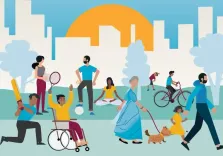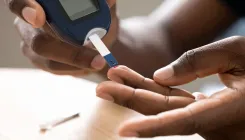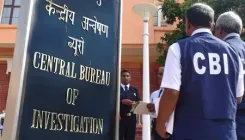Understanding Guillain-Barré Syndrome: Key Signs and When to Seek Help

Synopsis
Key Takeaways
- GBS is a rare but serious nerve disorder.
- Symptoms include tingling, weakness in limbs, and potential paralysis.
- Seek immediate medical help for new-onset symptoms.
- Preventive measures include proper food handling and hygiene.
- Timely treatment can lead to full recovery.
New Delhi, Jan 27 (NationPress) Tingling, weakness of hand-grip or foot drop may indicate Guillain-Barré Syndrome (GBS), according to health professionals on Monday, as reported cases have surged to over a hundred in Pune, Maharashtra.
The health department of Maharashtra reported on Sunday what is believed to be the first death connected to the GBS outbreak, which is predominantly affecting Pune.
The Union health ministry has dispatched a team to the Sinhgad area of Pune, where the outbreak is currently centered.
What is GBS?
GBS is a serious condition that can escalate quickly, often rendering the patient bedridden within days. It is characterized by damage to the nerves, leading to significant weakness in the limbs, trunk, and facial muscles.
This syndrome is frequently preceded by a bacterial or viral infection, such as diarrhea caused by Campylobacter Jejuni or viral infections like dengue or chikungunya, which can severely impact the nerves.
In individuals affected by GBS, the immune system erroneously attacks healthy nerves located outside the brain and spinal cord, resulting in weakness, paralysis, or even death in some cases.
“GBS is a rare yet potentially debilitating nerve disorder brought on by the immune system mistakenly targeting the body’s own nerves. It is typically triggered by gastrointestinal or respiratory infections,” stated Rajeev Jayadevan, Chairman of the Kerala State IMA Research Cell, to IANS.
Campylobacter, a bacterial gut infection that spreads via contaminated food and water, has been associated with the ongoing outbreak. Initial symptoms of GBS often include gastrointestinal discomfort such as nausea, vomiting, and diarrhea prior to the onset of GBS.
This condition results in “progressive weakness, initially affecting the lower limbs, and can also impact the muscles responsible for breathing,” the expert explained. However, it’s essential to recognize that the vast majority of infections do not lead to GBS, according to Jayadevan, who is also a gastroenterologist based in Kochi.
“Enhancing sanitation, water, and air quality along with general strategies to diminish the spread of infections within communities can significantly reduce the risk,” he advised.
When to Seek Medical Attention?
The illness usually presents abruptly and can advance over a span of 4 weeks. Some patients may experience rapid deterioration, while others may see a slower progression.
While swift diagnosis and treatment of GBS are essential, as delays can worsen outcomes, the symptoms often resemble those of other diseases and may not always indicate GBS.
“If an individual experiences a new tingling sensation and weakness, particularly in the legs, accompanied by difficulty walking, they should seek immediate care at a hospital equipped with advanced facilities,” Jayadevan advised, adding that “facial weakness may manifest as drooping eyelids (ptosis) or an uneven smile.”
Dr. Pawan Ojha, Director of Neurology at a Vashi-based hospital, emphasized that the public should not panic over mild tingling or numbness in the limbs or face.
“However, GBS should be considered if there is weakness in the hand-grip, foot drop, or challenges in raising arms above the shoulders or standing up,” Ojha mentioned.
He pointed out that some patients may also experience severe autonomic disturbances, which can include fluctuating blood pressure, irregular heart rates, and life-threatening temperature, sweating, bowel, or urinary issues.
“Any difficulties in speaking, swallowing, or breathing may also indicate severe GBS and necessitate urgent medical evaluation,” the expert highlighted. “Although these symptoms are not exclusively indicative of GBS, they require prompt and thorough assessment to identify the root cause. With contemporary medical treatments, full recovery is feasible in most instances,” Jayadevan remarked.
Patients diagnosed with GBS should be hospitalized for close monitoring of vital signs and potential deterioration, as well as for urgent intervention. Severe cases may necessitate admission to an ICU and ventilation support. Complications such as abnormal heart rhythms, infections, blood clots, and irregular blood pressure levels require early detection and management.
Immediate treatment during the acute phase usually involves intravenous immunoglobulin infusions over a five-day span or plasma exchange over a week. Steroids are generally avoided.
Some patients may require mobility aids like braces or wheelchairs temporarily, according to Ojha. Additionally, physical therapy is crucial for patients to recover strength and mobility and to prevent secondary infections.
Preventing GBS
The state health department has advised that GBS can be prevented to some extent by following basic precautions, such as consuming boiled or bottled water, thoroughly washing fruits and vegetables before consumption, properly cooking poultry and meat, and steering clear of raw or undercooked foods, particularly salads, eggs, kebabs, or seafood.
They also recommended keeping raw and cooked items separate, disinfecting kitchen surfaces and utensils after handling raw meat, and practicing general hygiene measures, including frequent handwashing with soap, especially before meals and after using the restroom.









